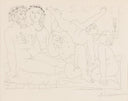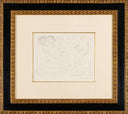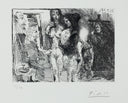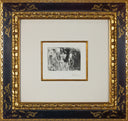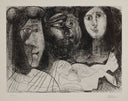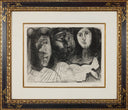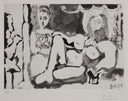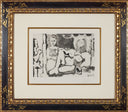About the Artist
Pablo Picasso (1881 – 1873) was not only the defining painter of the 20th century, he was also one of its most inventive printmakers. From the early 1900s to the last years of his life, Picasso treated the print workshop as a laboratory, pushing intaglio, aquatint, sugar-lift, and later linocut to their expressive limits. Collectors prize his graphic work for its virtuosity, immediacy, and the way it maps his lifelong themes—myth, the studio, bullfighting, love, and metamorphosis—across exquisitely crafted editions. Recent museum exhibitions underscore this central truth: to understand Picasso fully, begin with the prints.
The Vollard Suite (1930–1937)
A landmark cycle of 100 intaglio prints, the Vollard Suite charts a protean mythology of the sculptor’s studio, the Minotaur, and the artist–model relationship. Commissioned by dealer Ambroise Vollard and printed at Roger Lacourière’s atelier, the series moves from crystalline line etching to burin, aquatint, and sugar-lift effects that approach painterly tone. The British Museum holds a complete set (acquired 2011), and numerous museums exhibit individual plates; the suite culminates in three portraits of Vollard dated March 4, 1937. For connoisseurs, it is the essential statement of Picasso’s early intaglio mastery.
Histoire Naturelle—Textes de Buffon (plates 1936; published 1942)
Commissioned by Vollard, Picasso’s animal studies reinvent the natural-history illustration. Sinuous, economical lines conjure the essence of each creature while foregrounding the artist’s hand, graphic elegance with a naturalist’s acuity. Holdings at Buffalo AKG Art Museum and the Yale University Art Gallery anchor the suite’s scholarly documentation.
La Tauromaquia (1957–59; published 1959)
Picasso’s lifelong fascination with the bullring finds its definitive graphic expression in this illustrated book after the 1796 treatise by Pepe Illo. Twenty-six lift-ground aquatints (plus a drypoint) translate the arc of the corrida into velvety blacks and luminous halftones, an object lesson in how he used intaglio chemistry to paint with light. The Museum of Modern Art’s copy is a standard reference for technique and sequencing.
The Linocut Revolution
In the late 1950s and early 1960s, Picasso, working in Vallauris with printer Hidalgo Arnéra, transformed linocut from a poster medium into high art. Their key innovation was the reduction linocut - a technique that Picasso and Arnéra did not invent, but were the first to exploit fully, to refine technically, and to demonstrate its artistic potential at the highest level. Rather than carving a separate block for each color, Picasso progressively cut and printed a single block through successive states, destroying it as he worked (the technique was sometimes referred to as the ‘suicide method.’). The method demanded total command of registration and form, yielding prints of striking chromatic unity. Picasso’s mastery, combined with Arnéra’s technical brilliance as a printer, produced landmark works that are now touchstones for both scholars and connoisseurs (think of portraits after Cranach, Jacqueline Roque, and the Vallauris posters). Harvard Art Museums, the Clark Art Institute, and the Oklahoma City Museum of Art detail this collaboration and process, which is now foundational in printmaking pedagogy and a sought-after category for collectors.
The 347 Series (1968)
Created in a burst from March to October 1968 with Aldo and Piero Crommelynck and published by Galerie Louise Leiris, the 347 Suite is Picasso’s late graphic magnum opus—erotic caprice, theatre, artist-and-model meditations, even episodes from La Celestina. Technically encyclopedic, the series ranges from wiry drypoint to luscious sugar-lift aquatint.
La Célestine (1971)
Picasso returned to Fernando de Rojas’s picaresque masterpiece while working on the 347 Series. Individual scenes appear within the 347 Suite, while his late illustrated book La Célestine (1971) comprises all 66 etchings and aquatints on the subject, evidence of his relentless printmaking energy carrying into his nineties.
Picasso’s graphic work offers something singular to today’s collectors: immediacy of touch, clarity of narrative, and a fully traceable creative process (often through proofs and documented states). Suites like the Vollard, La Tauromaquia, Histoire Naturelle, La Célestine, and the 347 Series give coherent, museum-anchored collecting frameworks, each with clear scholarly literature, institutional holdings, and strong exhibition histories. With major museums continuing to foreground Picasso the printmaker, these works provide blue-chip art-historical significance with the intimacy and technical brilliance that only the printing press can deliver.











